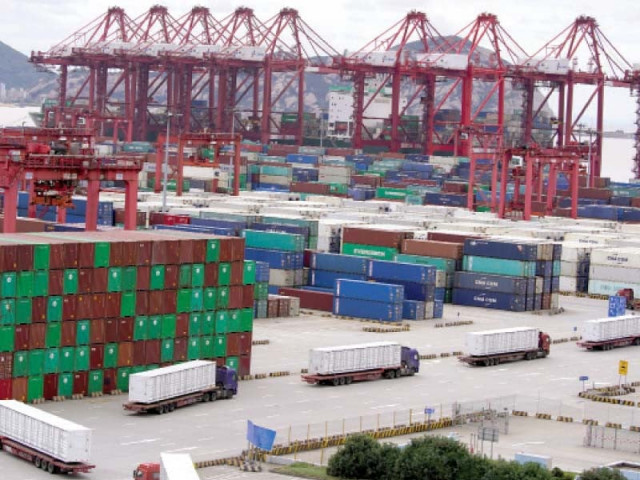World trade on rise despite tensions
WTO report doesn’t cover de-dollarisation of economies, its impact on trade

Global trade and international cooperation are still on the rise despite the new narrative of decoupling and increasing trade disputes following the eruption of Ukraine war that impacted $85 billion worth of trade, says the new World Trade Report.
Negative headlines are obscuring a more optimistic global trade picture as even trade between the United States and China – the two largest trade partners – reached its highest level last year despite escalation of trade tensions between them since 2018, according to the report launched by the World Trade Organisation (WTO) on Tuesday.
The report underlined the threats to the multilateral trading system from the Ukraine war and fragmentation of trade on geopolitical and like-minded countries’ lines.
If the world is split into two blocs, real income would decline by 5% in the longer term and it will further fall by 12% for the poorest countries, said the report while emphasising the re-globalisation of world trade. The report did not cover the emerging trade issue – the de-dollarisation of economies. “It doesn’t cover the issue of de-dollarisation, therefore, its impact on trade was not assessed,” said Ralph Ossa, Chief Economist of the WTO while responding to The Express Tribune.
Ossa pointed out that although trade between the US and China increased, there was reorientation within various products.
Trade tensions that began in 2018 between the world’s two largest trading partners saw tit-for-tat escalation of import tariffs. The report noted that despite all obstacles, bilateral trade increased.
Unilateral trade-related measures are generating an increasing number of trade measures that are raised by WTO members in different bodies. The nature of these concerns is also changing. The WTO report showed how re-globalisation, or increased international cooperation and broader integration, can support security, inclusiveness and environmental sustainability.
The report was formally unveiled in Geneva at a session of the WTO Public Forum 2023. The session also marks the formal inauguration of the forum, which is the largest outreach event of the WTO. The report recognised that the headwinds for trade policy cooperation and increased trade policy uncertainty brought back by recent shocks can further reshape global trade.
It cautioned that trade strategies to re-shore manufacturing production would lead to an overall decline in the importance of trade in the global economy. Similarly, the strengthening production networks with likeminded countries would lead to fragmentation of the global economy along regional and geopolitical lines. Now, nations are blocking trade in goods that can be used for defence purposes.
Major shocks in the past 15 years have led to the sense that rather than making countries economically stronger, globalisation exposes them to excess risks. These perceptions have fuelled narratives for localisation of supply chains and trade policy strategies based on geopolitical concerns.
WTO members have increasingly implemented new trade restrictions after the start of Ukraine war. As many as 96 export-related restrictions on food, feed and fertiliser post-Ukraine war were placed and 68 are still in place covering $85 billion worth of trade, according to the report. Electronic equipment accounts for the highest proportion of the export value of potential bottleneck products that can be affected due to trade fragmentation on geopolitical lines. Semiconductors and mobile phones fall in this vulnerable category.
The US has recently imposed some restrictions on electronic technologies. The multilateral trading system is also affected by security concerns, which are not just limited to conflicts and include trade concerns rooted in security, said the report.
The number of trade concerns raised in the WTO Committee on Sanitary and Phytosanitary measures has shown a sharp increase since 2020 while concerns raised at the Committee on Technical Barriers to Trade have increased since 2019. Similarly, trade concerns raised at the Committee on Market Access increased “exponentially”, which more than doubled within three years.
In public debate, terms such as offshoring and outsourcing are replaced by re-shoring, near-shoring, friend-shoring and decoupling.
According to the report, despite various geopolitical tensions and conflicts, international trade plays an indispensable role in creating a more secure, inclusive and sustainable world. It is due to the fact that global trade is anchored in a strengthened multilateral trading system, which has been developed for the last three-quarters of the century. The report observed that recent crises, such as the Covid-19 pandemic and the war in Ukraine, have fed into perceptions that globalisation exposes economies to excessive risks.
“Consequently, a trade-sceptic narrative has gained traction, suggesting that international trade is an obstacle to building a more secure, inclusive and sustainable world,” it added. “Viewing interdependence as a vice rather than a virtue, policymakers are now placing greater emphasis on economic independence.”
But the report showed that a better alternative to fragmentation is “re-globalisation”, meaning extending trade integration to more people, economies and issues.
International trade, anchored in a strengthened multilateral trading system, plays an indispensable role in creating a more secure, inclusive and sustainable world, according to the report.
Published in The Express Tribune, September 13th, 2023.
Like Business on Facebook, follow @TribuneBiz on Twitter to stay informed and join in the conversation.



















COMMENTS
Comments are moderated and generally will be posted if they are on-topic and not abusive.
For more information, please see our Comments FAQ